外研版(2019) 选择性必修第四册 Unit 4 Everyday Economics Developing ideas Reading课件 (29张)
文档属性
| 名称 | 外研版(2019) 选择性必修第四册 Unit 4 Everyday Economics Developing ideas Reading课件 (29张) | 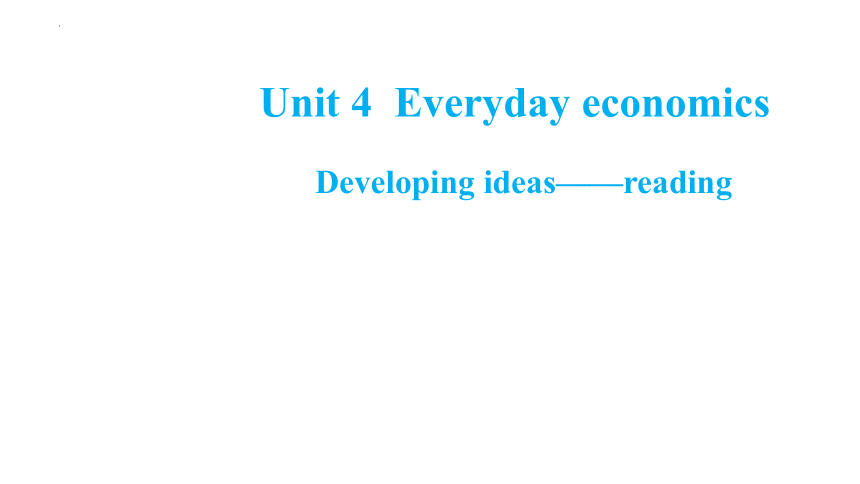 | |
| 格式 | zip | ||
| 文件大小 | 695.9KB | ||
| 资源类型 | 教案 | ||
| 版本资源 | 外研版(2019) | ||
| 科目 | 英语 | ||
| 更新时间 | 2022-08-03 10:20:44 | ||
图片预览

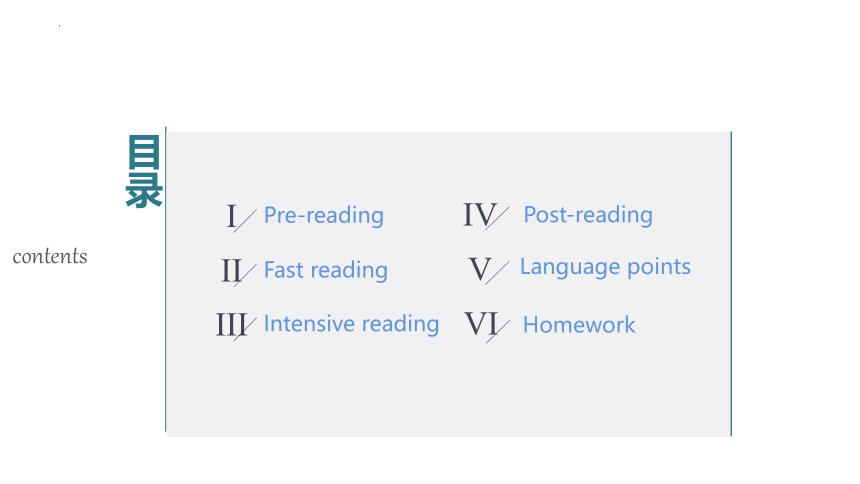
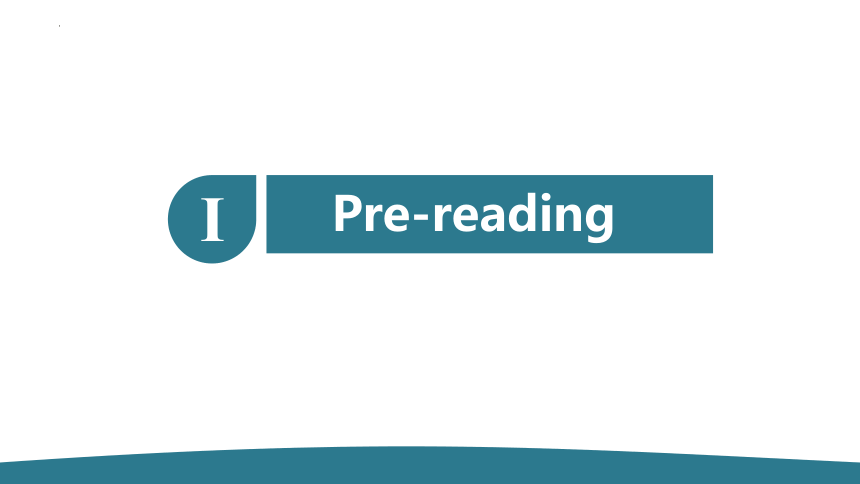
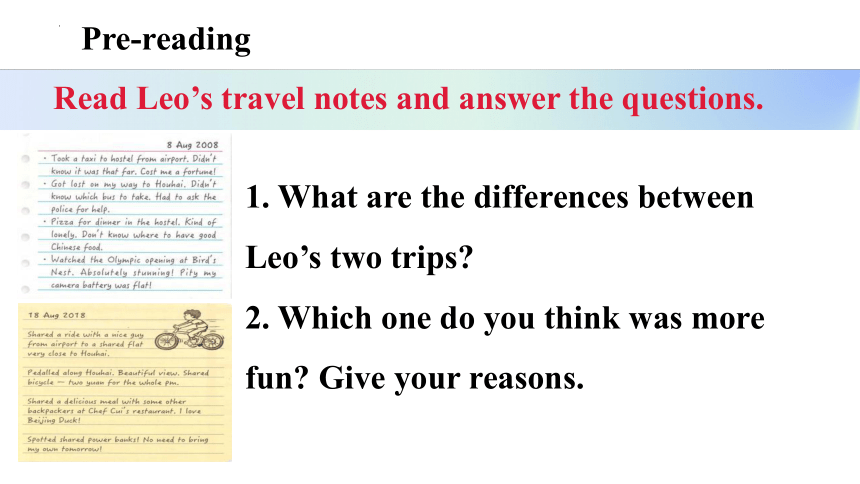
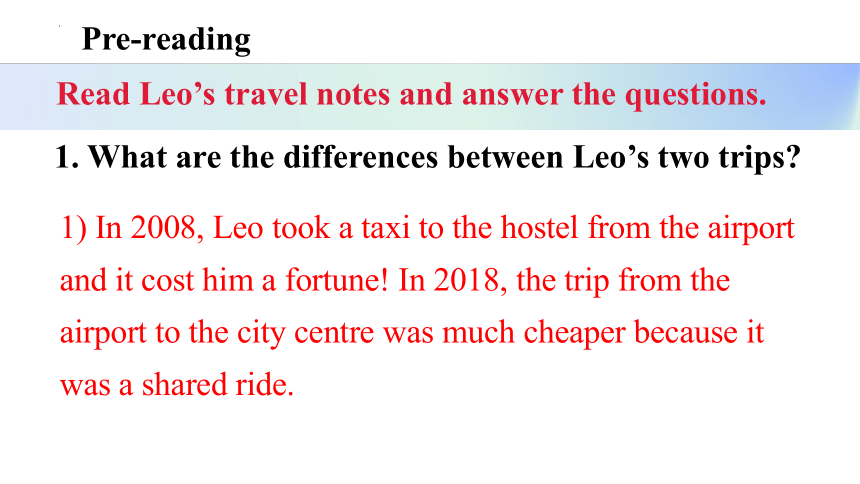
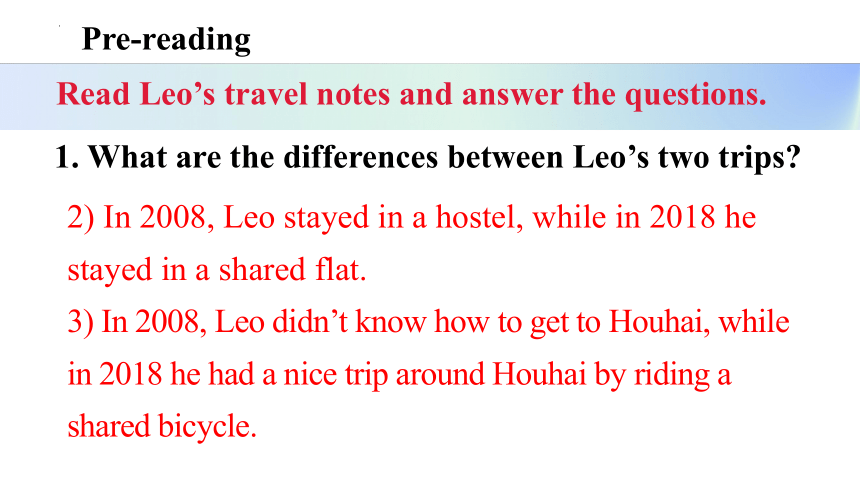
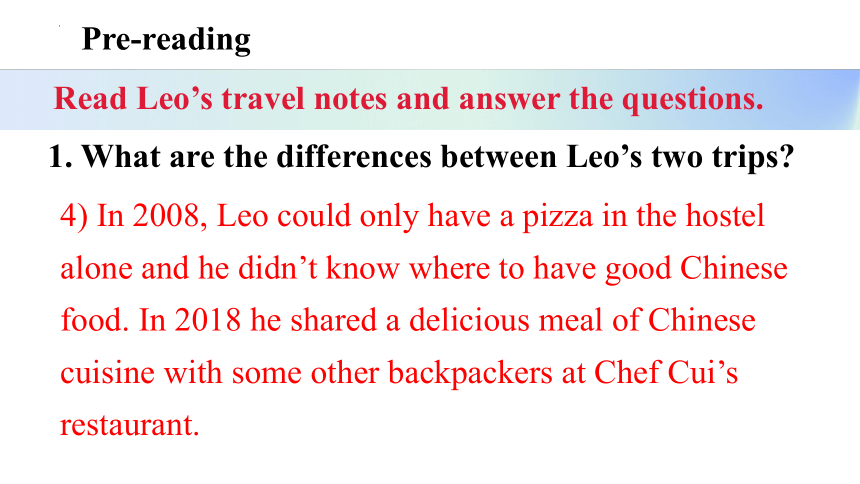
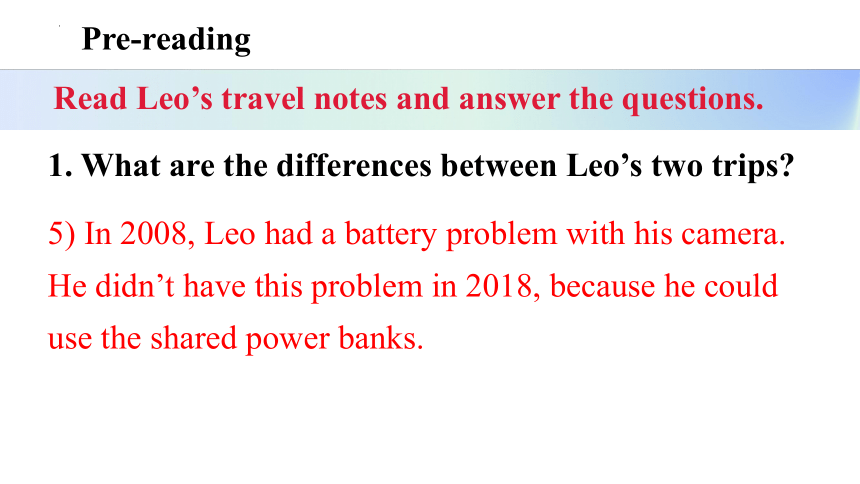
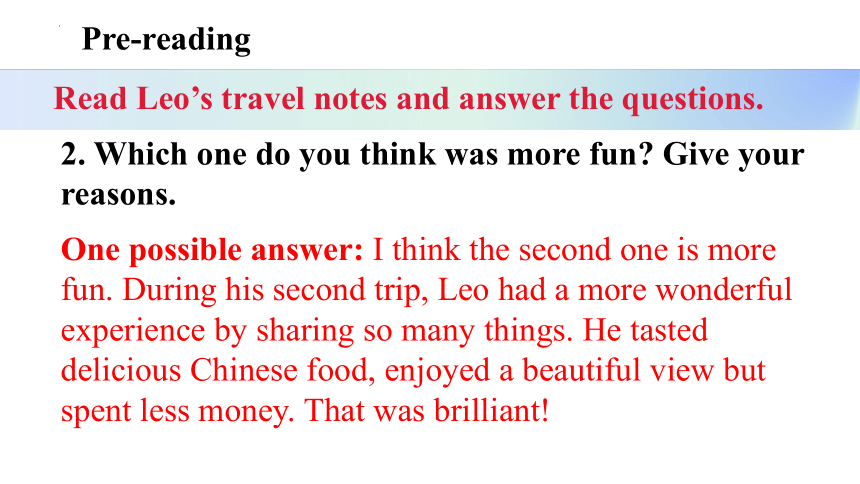
文档简介
(共29张PPT)
Developing ideas——reading
Unit 4 Everyday economics
目录
contents
Pre-reading
I
Language points
Ⅳ
Fast reading
II
Homework
Ⅴ
Intensive reading
III
Post-reading
Ⅵ
I
Pre-reading
Pre-reading
1. What are the differences between Leo’s two trips
2. Which one do you think was more fun Give your reasons.
Read Leo’s travel notes and answer the questions.
Pre-reading
1. What are the differences between Leo’s two trips
1) In 2008, Leo took a taxi to the hostel from the airport and it cost him a fortune! In 2018, the trip from the airport to the city centre was much cheaper because it was a shared ride.
Read Leo’s travel notes and answer the questions.
Pre-reading
1. What are the differences between Leo’s two trips
2) In 2008, Leo stayed in a hostel, while in 2018 he stayed in a shared flat.
3) In 2008, Leo didn’t know how to get to Houhai, while in 2018 he had a nice trip around Houhai by riding a shared bicycle.
Read Leo’s travel notes and answer the questions.
Pre-reading
1. What are the differences between Leo’s two trips
4) In 2008, Leo could only have a pizza in the hostel alone and he didn’t know where to have good Chinese food. In 2018 he shared a delicious meal of Chinese cuisine with some other backpackers at Chef Cui’s restaurant.
Read Leo’s travel notes and answer the questions.
Pre-reading
1. What are the differences between Leo’s two trips
5) In 2008, Leo had a battery problem with his camera. He didn’t have this problem in 2018, because he could use the shared power banks.
Read Leo’s travel notes and answer the questions.
Pre-reading
2. Which one do you think was more fun Give your reasons.
One possible answer: I think the second one is more fun. During his second trip, Leo had a more wonderful experience by sharing so many things. He tasted delicious Chinese food, enjoyed a beautiful view but spent less money. That was brilliant!
Read Leo’s travel notes and answer the questions.
Look at the title of the passage and talk about your understanding of it.
Pre-reading
By sharing, you can be using what belongs to me, and so can I. The resources are used more often due to sharing.
Now read the passage and check your understanding.
II
Fast reading
a. To highlight the key benefits of the sharing economy.
b. To explain and elaborate on the sharing economy.
c. To lead the topic from sharing in childhood to sharing in economic activities.
d. To illustrate various drawbacks of the sharing economy.
e. To predict the future of the sharing economy.
Fast reading
Match the paragraphs to their functions and give your reasons.
a. To highlight the key benefits of the sharing economy.
Fast reading
Para. 3. It meets people’s increasing demand for quality goods and services at competitive prices. It allows people to make or save money. It helps people make connections and even make new friends. It favours the environment by encouraging people to reuse items and reducing pollution.
Match the paragraphs to their functions and give your reasons.
b. To explain and elaborate on the sharing economy.
Fast reading
Para. 2. Sharing has expanded to almost every aspect of people’s lives. People are using technology to reduce the money that they spend on goods and services, or to make money out of those that they don’t use themselves all of the time. The sharing economy is taking off in all sorts of areas.
Match the paragraphs to their functions and give your reasons.
c. To lead the topic from sharing in childhood to sharing in economic activities.
Fast reading
Para. 1. By saying that we have been told since we were toddlers that “It’s good to share”, the author starts paragraph one and leads into the topic on sharing gradually.
Match the paragraphs to their functions and give your reasons.
d. To illustrate various drawbacks of the sharing economy.
Fast reading
Para. 4. The sharing economy is developing faster than existing regulations or ongoing supervision. And it is subject to abuse of trust. Personal information about almost every part of our lives is not yet secure in the sharing economy.
Match the paragraphs to their functions and give your reasons.
e. To predict the future of the sharing economy.
Fast reading
Para. 5.
By raising questions, the author leads the readers to think about the future of the sharing economy.
Match the paragraphs to their functions and give your reasons.
Fast reading
Think about the structure of the passage and complete the diagram.
It meets people’s increasing demand for 1__________________.
It allows people to make or save money.
It helps people 2 _______ and even 3_______________.
It favours the environment by
4 ___________ and 5 ___________.
The sharing economy is developing faster than 6 __________________.
The sharing economy is subject to 7___________________________.
Personal information about 8_________________ is 9_________ in the sharing economy.
The sharing economy
Benefits
Problems
Fast reading
It meets people’s increasing demand for 1________
___________________________________________.
It allows people to make or save money.
It helps people 2 _________________ and even 3_________________.
It favours the environment by 4 _______________
_____________________and 5_________________.
quality
goods and services at competitive prices
make connections
make new friends
encouraging
people to reuse items
reducing pollution
Think about the structure of the passage and complete the diagram.
Benefits
Fast reading
The sharing economy is developing faster than
6 _________________________________________.
The sharing economy is subject to 7_____________.
Personal information about 8__________________
_________ is 9________________ in the sharing economy.
existing regulations or ongoing supervision
abuse of trust
almost every part of
our lives
not yet secure
Think about the structure of the passage and complete the diagram.
Problems
Fast reading
A two-sided argumentative essay investigates a topic by presenting collated information and evaluating evidence from both sides. It should close by wrapping up the
argument. It could conclude in favour of the arguments, or simply stay neutral with no particular preference.
Learning to learn
III
Intensive reading
Intensive reading
1. What is the author’s attitude towards the sharing economy
2. What do you think are other benefits and problems
of the sharing economy How could we address the potential problems
3. What are your experiences of the sharing economy Share these experiences with the class.
4. How do the two reading passages in this unit help deepen your understanding of new economic trends
1. What is the author’s attitude towards the sharing economy
The author acknowledges the benefits of the sharing economy, but he also takes concern about the problems of it. The author is also curious about the future of the sharing economy.
Intensive reading
2. What do you think are other benefits and problems of the sharing economy How could we address the potential problems
Intensive reading
One possible answer: I think by sharing, we can make better use of the resources. But there are still problems, such as the difficulty with management. The government should put in place strict laws to monitor and punish those who violate the rules of sharing economy.
3. What are your experiences of the sharing economy Share these experiences with the class.
Once I made a trip to Yangshuo, in Guilin. I didn’t live in a hotel as usual but shared a house with a local family. The family were friendly and I got warm hospitality. The experience was quite different and I enjoyed it.
Intensive reading
4. How do the two reading passages in this unit help deepen your understanding of new economic trends
Intensive reading
One possible answer:
From the first reading passage, I realize that it is more than a good idea to start one’s own business. After learning the second reading passage, I know for sure that sharing is the new economic trend.
Homework
VI
Homework
1. Read the text again and again to have a better understanding of the sharing economy.
2. Write down your ideas about the future of the sharing economy.
Developing ideas——reading
Unit 4 Everyday economics
目录
contents
Pre-reading
I
Language points
Ⅳ
Fast reading
II
Homework
Ⅴ
Intensive reading
III
Post-reading
Ⅵ
I
Pre-reading
Pre-reading
1. What are the differences between Leo’s two trips
2. Which one do you think was more fun Give your reasons.
Read Leo’s travel notes and answer the questions.
Pre-reading
1. What are the differences between Leo’s two trips
1) In 2008, Leo took a taxi to the hostel from the airport and it cost him a fortune! In 2018, the trip from the airport to the city centre was much cheaper because it was a shared ride.
Read Leo’s travel notes and answer the questions.
Pre-reading
1. What are the differences between Leo’s two trips
2) In 2008, Leo stayed in a hostel, while in 2018 he stayed in a shared flat.
3) In 2008, Leo didn’t know how to get to Houhai, while in 2018 he had a nice trip around Houhai by riding a shared bicycle.
Read Leo’s travel notes and answer the questions.
Pre-reading
1. What are the differences between Leo’s two trips
4) In 2008, Leo could only have a pizza in the hostel alone and he didn’t know where to have good Chinese food. In 2018 he shared a delicious meal of Chinese cuisine with some other backpackers at Chef Cui’s restaurant.
Read Leo’s travel notes and answer the questions.
Pre-reading
1. What are the differences between Leo’s two trips
5) In 2008, Leo had a battery problem with his camera. He didn’t have this problem in 2018, because he could use the shared power banks.
Read Leo’s travel notes and answer the questions.
Pre-reading
2. Which one do you think was more fun Give your reasons.
One possible answer: I think the second one is more fun. During his second trip, Leo had a more wonderful experience by sharing so many things. He tasted delicious Chinese food, enjoyed a beautiful view but spent less money. That was brilliant!
Read Leo’s travel notes and answer the questions.
Look at the title of the passage and talk about your understanding of it.
Pre-reading
By sharing, you can be using what belongs to me, and so can I. The resources are used more often due to sharing.
Now read the passage and check your understanding.
II
Fast reading
a. To highlight the key benefits of the sharing economy.
b. To explain and elaborate on the sharing economy.
c. To lead the topic from sharing in childhood to sharing in economic activities.
d. To illustrate various drawbacks of the sharing economy.
e. To predict the future of the sharing economy.
Fast reading
Match the paragraphs to their functions and give your reasons.
a. To highlight the key benefits of the sharing economy.
Fast reading
Para. 3. It meets people’s increasing demand for quality goods and services at competitive prices. It allows people to make or save money. It helps people make connections and even make new friends. It favours the environment by encouraging people to reuse items and reducing pollution.
Match the paragraphs to their functions and give your reasons.
b. To explain and elaborate on the sharing economy.
Fast reading
Para. 2. Sharing has expanded to almost every aspect of people’s lives. People are using technology to reduce the money that they spend on goods and services, or to make money out of those that they don’t use themselves all of the time. The sharing economy is taking off in all sorts of areas.
Match the paragraphs to their functions and give your reasons.
c. To lead the topic from sharing in childhood to sharing in economic activities.
Fast reading
Para. 1. By saying that we have been told since we were toddlers that “It’s good to share”, the author starts paragraph one and leads into the topic on sharing gradually.
Match the paragraphs to their functions and give your reasons.
d. To illustrate various drawbacks of the sharing economy.
Fast reading
Para. 4. The sharing economy is developing faster than existing regulations or ongoing supervision. And it is subject to abuse of trust. Personal information about almost every part of our lives is not yet secure in the sharing economy.
Match the paragraphs to their functions and give your reasons.
e. To predict the future of the sharing economy.
Fast reading
Para. 5.
By raising questions, the author leads the readers to think about the future of the sharing economy.
Match the paragraphs to their functions and give your reasons.
Fast reading
Think about the structure of the passage and complete the diagram.
It meets people’s increasing demand for 1__________________.
It allows people to make or save money.
It helps people 2 _______ and even 3_______________.
It favours the environment by
4 ___________ and 5 ___________.
The sharing economy is developing faster than 6 __________________.
The sharing economy is subject to 7___________________________.
Personal information about 8_________________ is 9_________ in the sharing economy.
The sharing economy
Benefits
Problems
Fast reading
It meets people’s increasing demand for 1________
___________________________________________.
It allows people to make or save money.
It helps people 2 _________________ and even 3_________________.
It favours the environment by 4 _______________
_____________________and 5_________________.
quality
goods and services at competitive prices
make connections
make new friends
encouraging
people to reuse items
reducing pollution
Think about the structure of the passage and complete the diagram.
Benefits
Fast reading
The sharing economy is developing faster than
6 _________________________________________.
The sharing economy is subject to 7_____________.
Personal information about 8__________________
_________ is 9________________ in the sharing economy.
existing regulations or ongoing supervision
abuse of trust
almost every part of
our lives
not yet secure
Think about the structure of the passage and complete the diagram.
Problems
Fast reading
A two-sided argumentative essay investigates a topic by presenting collated information and evaluating evidence from both sides. It should close by wrapping up the
argument. It could conclude in favour of the arguments, or simply stay neutral with no particular preference.
Learning to learn
III
Intensive reading
Intensive reading
1. What is the author’s attitude towards the sharing economy
2. What do you think are other benefits and problems
of the sharing economy How could we address the potential problems
3. What are your experiences of the sharing economy Share these experiences with the class.
4. How do the two reading passages in this unit help deepen your understanding of new economic trends
1. What is the author’s attitude towards the sharing economy
The author acknowledges the benefits of the sharing economy, but he also takes concern about the problems of it. The author is also curious about the future of the sharing economy.
Intensive reading
2. What do you think are other benefits and problems of the sharing economy How could we address the potential problems
Intensive reading
One possible answer: I think by sharing, we can make better use of the resources. But there are still problems, such as the difficulty with management. The government should put in place strict laws to monitor and punish those who violate the rules of sharing economy.
3. What are your experiences of the sharing economy Share these experiences with the class.
Once I made a trip to Yangshuo, in Guilin. I didn’t live in a hotel as usual but shared a house with a local family. The family were friendly and I got warm hospitality. The experience was quite different and I enjoyed it.
Intensive reading
4. How do the two reading passages in this unit help deepen your understanding of new economic trends
Intensive reading
One possible answer:
From the first reading passage, I realize that it is more than a good idea to start one’s own business. After learning the second reading passage, I know for sure that sharing is the new economic trend.
Homework
VI
Homework
1. Read the text again and again to have a better understanding of the sharing economy.
2. Write down your ideas about the future of the sharing economy.
